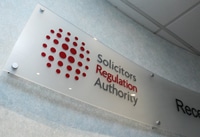Firms applying for alternative business structure (ABS) status believe the Solicitors Regulation Authority (SRA) takes too long to approve applications and its staff are too “bureaucratic”, according to the regulator’s own research.
Only 12% of firms said their application had been handled in a “timely manner”, while more than half described the SRA staff dealing with them as “bureaucratic”.
A further, in-depth, report on six successful and two unsuccessful applicants uncovered claims of an “information vacuum” at the SRA, firms being asked to “drop everything” to respond to enquiries and “an impression of disorganisation”.
Researchers carried out an online survey of 41 ABSs and five firms which had unsuccessfully applied for ABS status, meaning that “most firms had experienced the initial licensing process and not the revised application process and forms rolled out in spring 2013”.
The SRA’s ABS work has been under close scrutiny from the Legal Services Board, and it emerged last week that the SRA has cut the ABS backlog and waiting times significantly.
Almost all applicants (93%) surveyed by the SRA said staff were professional to deal with, but only 56% found that they communicated effectively.
Fewer than half (43%) said it was clear why information was being requested and how it would be used. An even smaller number (39%) found the SRA website and online resources clear and useful.
Two-thirds said the licence application process did not enhance their knowledge of risk management, though 5% said it did significantly. A small minority (15%) paid for external help with their license application.
The in-depth report based on interviews with eight of the survey firms, by ICF GHK consultants, included complaints that “information was not passed between SRA staff” or, when first engaging with the authorisation team, “they didn’t know who we were”.
Common complaints included disproportionate information demands from firms which felt they were “known to the SRA or had a simple ABS model”, meaning they could have “somehow” benefited from an expedited process.
Section 13 of the Legal Services Act, which requires non-lawyers with significant interests in ABS firms to be approved, raised “significant challenges” for firms.
These included the need for the equivalent of CRB checks on foreign individuals who wanted to invest, problems with investments from firms operating through fund managers, and a lack of clarity on how investors’ history would be interpreted by the SRA.
One firm reported that apparent confusion by the regulator on the scope of the section 13 process resulted in over 50 declarations sought from individuals being negotiated down to 20.
“It was mentioned by several firms that schedule 13 requirements were the main barrier to the ABS process operating as an effective means of opening up the legal services market.”
However, there were no examples of investors refusing to comply or withdrawing as a result of the process.
















Leave a Comment